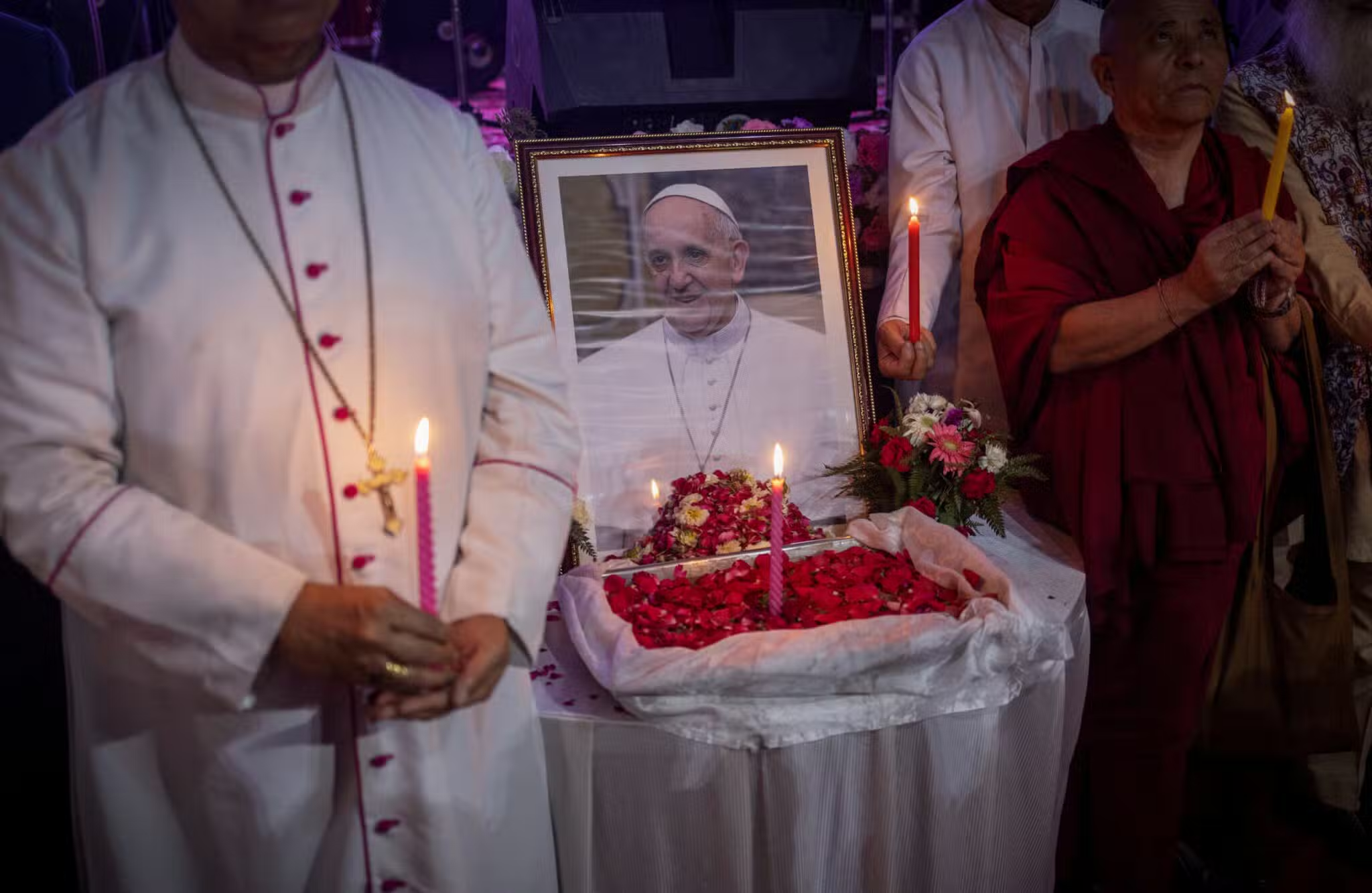When it comes to spirituality, grandparents can make a big difference.
“NAMA,” my grandson Will asked, “how do you talk to God?” That was a big question coming from an 8-year-old who just moments before had been crawling along the sidewalk, vision pasted on the path of a string of ants scurrying along the sand that separated the bricks. I could think of only one way to respond—honestly.
“Well, Will, I just talk to God like I talk to you. I say ‘thank you’ for the good stuff in my life—good things like you! I ask for help when I or others need it. And I say to God, like I say to you, ‘I love you!’”
Silence followed. Will is the quiet, thinker type.
“Do you talk to God, Will?”
“Yeah, sometimes.”
More silence.
Having been entrusted with the tender task of explaining how one talks to God, I slipped back through the decades to retrieve my first memory of prayer. There I was, snuggled once again in my grandma’s huge sleigh bed.
As a young child, I spent many weekends at Grandma and Grandpa’s small farm. After a day filled with farm fun, Grandma would tuck me into her larger-than-life bedstead, later climbing in herself. Her whispered prayers for members of her family echo through the many years that separate those times from today. Though our family was not a churchgoing family in those days, Grandma and her prayers created in me a deep desire to know this God to whom she prayed. That desire has never left me. This is the great inheritance I hope to leave my children and grandchildren.
Share the Gift of Faith
After answering Will’s question (and wishing I had done better!), questions popped to mind. Do grandparents have a responsibility to help grandchildren develop faith? If the answer is yes, how can that be accomplished? If our own children were raised in an atmosphere of faith, why might there be gaps in their churchgoing? How can our grandchildren’s faith be supported without our being judgmental or interfering with the efforts of their parents?
Judgment might arise if we question our children’s and their spouses’ choices of different churches for their places of worship. Interference could damage relationships if the grandparents suggest what their children should do with their own families.
If our own child and their spouse choose not to attend church, we might simply and respectfully state to the grandchildren that that is a choice their parents make. An invitation to attend with Grandma and Grandpa might follow. As we seek ways to build faith in grandchildren, we must respect the faith choices of their parents, other grandparents, and relatives. Little is gained by criticism of another’s faith.
An old adage says, “God has no grandchildren.” But we do! How can we share with them the glorious gift of faith that we have gathered through our lives? Our spiritual care for our grandkids may have begun before they were born. Perhaps we prayed for grandchildren to enter our families, prayed for their health, and for a safe birth.
Some children seem to arrive in the world with a deep awareness of God’s love. At age 7, Laney begs to go to church. Young John asks interesting questions about faith matters. When Ellie first walked, whenever she came to visit, she would toddle as fast as her little legs would carry her through our house to the family room where a statue of the Holy Family sat on the coffee table. Carefully picking it up, she would plant a kiss right on baby
Jesus! That was a beginning of faith, a faith to be nurtured throughout her life.
Encouraging faith development in today’s younger generation comes with obstacles. We live in a whirling world of work and multiple activities. Two parents working outside their home, single-parent families, differing religious beliefs within a family, and demanding schedules may infringe on faith-building opportunities within families.
Finding Common Ground
Unfortunately, some individuals have left their spiritual roots because of unhealthy theology that was forced upon them as children. Meredith and Tom no longer attend Mass because of images that linger from Meredith’s childhood religious education where God was portrayed as a severe, punishing power who burns people in hell. Of that “You’ll go to hell if you don’t do. . .” theology she blurts, “Who needs it?”
Jack and Maddie’s children all married members of other denominations. As grandparents, Jack and Maddie believe their role is to support their children as they raise their families.
Even though they worship in different churches, they certainly worship the same God. Maddie plans holiday gatherings to draw the families together to bridge denominational differences rather than emphasize them.
Demonstrate Your Faith
Grandparents have an awesome role to play in the faith life of their grandchildren
as they guide their children’s children on the path of faith in gentle, loving ways. We cannot effectively tell grandchildren what to believe. Faith must be seen and lived to be authentic. However, we can lead our grandkids into the great truths of faith. The way we live our own faith is the primary way to guide them.
Beth and Ken take their grandchildren with them when they volunteer at a food pantry. One of their grandsons’ favorite gifts to receive for his birthday or Christmas is a grocery card so he can shop for the pantry and help stock the shelves. Donating gifts received at a birthday party to a charitable group delights the child who gives (and undoubtedly keeps his or her room a bit tidier, too!) and surely blesses those in need who receive. Beth and Ken help their grandkids understand that this is not just doing something good; it is faith put to work.
They were rewarded for their endeavors to help their grandchildren grow in faith by an assessment their grandson wrote for a school paper: “Grandparents are the most important people in the family, because they won’t last a long as your mom or your brother.
They love to be around you, and they are so much older than you that they probably have a lot of life experiences to share with you. They may be a bit more brittle, but they are as strong as steel in their hearts.”
That’s right. We grandparents won’t be around forever, so we must do what we can now in order to share the wisdom of faith we have gathered. Grandchildren will not always be children, either. So once again, now is the moment to touch their lives with the gift of faith.
Ways to Explore Faith
Developing faith doesn’t need to be super serious or boring. It can be fun and joyful! Try an “Eyes Wide Open” prayer as you hike with a grandchild. That is a way to discover God in all
things. As you walk, thank God for the delightful sights and events you share: a wild canary winging over the yard, a puddle to jump in, a puppy learning to walk on a leash, a rainbow on a rainy day, the joy of playing in the sprinkler on a steamy summer day, making snow angels in the winter white. Joy is always an occasion to give thanks to God. The “Eyes Wide Open” prayer is also a way to teach children that we can pray anytime, anywhere. We only need to begin.
Prayer gives children a place to take their anxieties. When a beloved pet dies, a friend is ill or injured in an accident, or things are troublesome at home, prayer links children to strength and peace beyond themselves. News—both local and around the world—can trouble children who are aware of frightening times. It may not be in the Bible, but Tennyson did write, “More things are wrought by prayer than this world dreams of.” Teaching our grandchildren to take their concerns to the Lord provides them with a valuable means to face life.
Bringing Faith to Life
Creating times of silence for grandchildren can be special times. Turning off the iPad and listening for a tree frog or identifying a bird’s song are ways of opening up to the beauty of silence. Prayer is not only talking to God. Prayer is listening to God’s message for us, perhaps not in words, but in the still of the morning or in the silence of the evening at bedtime. I like to remind my grandkids that the words listen and silent are composed from the same letters. Silence provides the space where one can listen and learn.
Discussing personal family names is another way to explore relationships in faith. A child who is named for a relative—deceased or living—can be told of the qualities that person possessed that led to their shared names. These qualities may reveal aspects of the individual’s Christian beliefs: kindness, trustworthiness, patience, wisdom. The child gains a sense of who her name calls her to emulate.
Asking a grandchild to think of the many names for God or Jesus expands understanding of the magnitude of our God and our savior. Knowing Jesus as our brother opens the door to knowing we have a friend who is with us at all times. While the concept of the Holy Spirit is complex—even for adults—children’s fascination with ghosts can enable them to begin to explore the idea that the Spirit of the Lord dwells within them. This Spirit isa good one, a holy one, who can be trusted to guide and inspire them.
Taking grandchildren with us to church offers balance between freestyle activities in which we discover God and the beauty of ritual found in the Liturgy of the Word and Liturgy of the Eucharist.
Together we experience the solemnity of these profound acts of faith. Sacred music heightens the celebration. Stories from Scripture may need discussion to understand. Breakfast following Mass can be a great discussion and learning time. Acting out the Scriptures after Mass may further imprint their message on the child. (There may be some Scriptures you would not want to act out!)
More Ways to Keep Connected
Literature provides another way to lead grandchildren along the faith path. Your favorite bookstore or library will have books for all ages telling how others seek and find God. A book does not have to be a specifically religious book. Faith factors can be sought in most high-quality juvenile literature.
Reading together opens discussions on matters of faith. Kids love to receive mail. Subscribing to faith-based magazines puts articles about faith with your grandchildren when you cannot be there. If you have teenage grandkids who have smartphones, you might look for apps that will encourage them to ponder spiritual things as they are texting their friends. Most teens won’t refuse a free app, and curiosity might bring them to access it.
You may be thinking that many of these suggestions are activities that parents might do with their children. That is true. The fact that you may encourage your grandchildren in similar ways as your children do doubles the impact. You are special in your grandkids’ lives.
As a generation once removed from the grandchild, you inhabit a special place. You are not the one responsible for frequent “clean up your room” reminders or “No, we cannot give our permission for you to go to that party” squelchers. You are free to be Grandma or Grandpa! You can truly be a “Godsend” whom your grandkids can trust.
Reaching Out over the Miles
Distance grandparenting doesn’t remove the possibility of helping grandchildren grow in faith. Email, Zoom, and phone calls offer opportunities to share what has happened in your day and link it to God’s presence in your life.
Tell about a scary moment when a car almost struck yours and you prayed a prayer of thanksgiving. Ask your grandchildren to pray for your friend who is in the hospital. Old-fashioned letter writing is another option. Jot a meaningful bit of Scripture down on paper.
Small gifts with a spiritual message—a book, statue, notepads with Scripture quotes, comic books about saints—might be sent. Kids love stories! You might write a story about how the Lord touched your life. Then tuck a prayer card into the envelope. And when those distant grandchildren come to visit, have a faith-based surprise for them to remind them of the faith you want to share with them.
What is our goal for our faith relationship with our grandkids? Our primary goal is to lead them to worship the God who loves them unconditionally. Grandchildren experience God’s love through our love for them. God’s love is so immense that Jesus chose to die to bring eternal life to those who follow him. Jesus’ dying and rising to new life is the heart of our faith. It’s a celebration, not something dull and meaningless!
Marcy plans to continue a family tradition by taking her grandchildren to a different church each Good Friday to pray the Stations of the Cross with her. They will share the joy of faith as they contemplate the meaning of the death and resurrection of Jesus. A 5-year-old once asked my mother, “What’s a grandma?” No grandparents graced her life. With her parents’ approval, my mom and dad “adopted” her and became her surrogate grandparents.
The faith side of that relationship led Candace to know God’s love through two individuals who cherished her. Just as not all children know their grandparents, not all elders have grandchildren in whom to nurture faith. If you lack grandkids, simply look around. Across the backyard fence, down the block, or at your church, there may be children in need of grandparents to guide them along the path of faith.
Mrs. Sharp, a faithful churchgoer, was a caregiver for 4-year-old David. His parents did not attend church, but David longed to go, so he asked Mrs. Sharp to take him. She responded, and David is a priest today. Grandparents—whether biological or not—can lead children to faith.
Grandparents are sowers of the seeds of faith. We may not see the fruit of our sowing immediately, but our call is to plant faith. We live in a society that frequently resists religious teachings and ignores moral codes. That can be hostile ground for sowing the seeds of faith, but if we are patient, faith can blossom.
Fran agonized when her granddaughter made some poor choices as a teenager. But she never gave up on her. She knew she had sown seeds of faith in Ashley’s life. She prayed . . . and she prayed. Ashley’s life changed. Fran followed one of the primary “rules” of grandparenting: pray! Couple prayer with living the faith you profess, and your grandkids will be blessed with growing faith. You will truly be GRANDparents!








